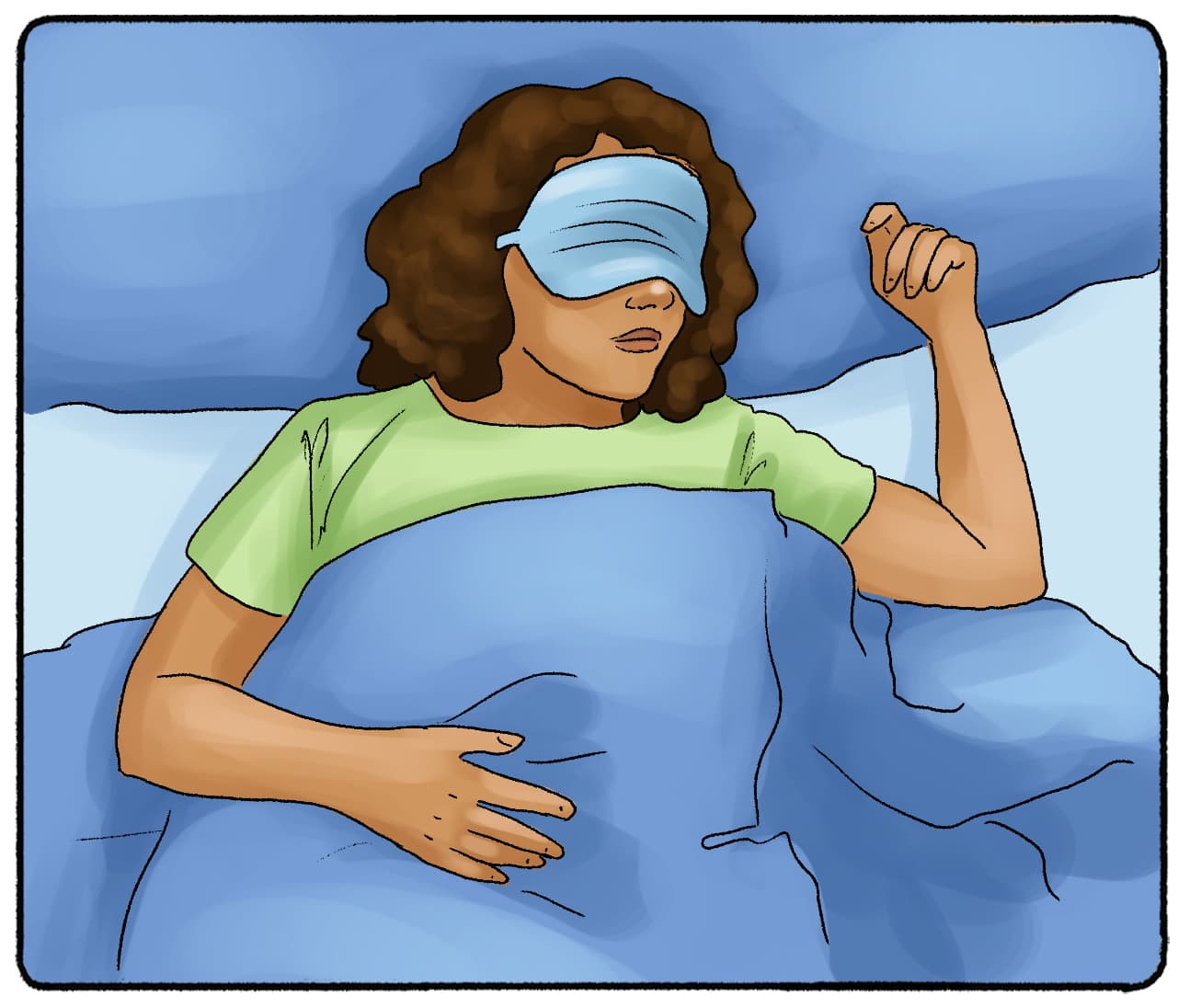These stress management techniques range from things that you can do in two seconds to things that take a much longer period of time. Many of these stress management techniques are free and accessible, while others require a small cost or big commitment. I have a dozen different stress management techniques to share, so try out the one that fits your lifestyle, interests, and budget.
Top Stress Management Techniques
- Watch a comedy special
- Spend time with people you love
- Foster or adopt a pet
- Set up a spa night for yourself
- Light a candle
- Take a deep breath
- Meditation
- Working out
- Sleep
- Schedule an appointment with a therapist
- Assess and set boundaries
- Journal
1) Watch a Comedy Special
When reflecting on the pandemics of centuries past, we can at least find comfort in the fact that we have Netflix. Search through a list of comedy specials and allow yourself to laugh tonight. Laughter not only reduces the release of stress in the body, but it can also relax the muscles, boost your immune system, and even reduce pain. Go ahead. Find something to laugh at tonight.
2) Spend Time With People You Love
Watch a comedy special alone, with your roommates, or with friends and family in other states. Apps like Zoom or Netflix Party allow you to watch, chat, and share moments together. Taking the time to spend time with others can help you reset your mind and find reassurance in these crazy times. Multiple studies show that social interaction and support can reduce stress and boost overall health. Social isolation and loneliness, on the other hand, increase the risk of everything from cardiovascular disease to diabetes. Even if you are staying home, a phone call or Zoom meeting with friends can help you stay healthy.
3) Foster or Adopt a Pet

Companionship doesn’t have to come from your own species. If you already have a pet, take some time to play with them, take a walk, or cuddle. All of these interactions can help reduce stress. If you do not have a pet, but live in a situation where a pet would be welcome, consider fostering or adopting a pet. The financial costs of a furry friend may only add more stress - if this is the case, consider volunteering at a local shelter and playing with pups who are also living in social isolation. They’ll be so happy to see you, and you’ll feel your stress melt away instantly!
4) Set Up a Spa Night For Yourself
Maybe you’re getting too much social interaction. You’re holed up in a house with roommates, parents, kids, and you feel overwhelmed. Take a night and treat yourself to a spa. I’m not talking about physically going to a spa. Set one up for yourself, in your own home. Maybe you run a nice, relaxing bath for yourself. Or you post up in your bedroom while you read a book, watch a movie, or give yourself a manicure.
No matter where you have your spa night, consider the five senses. Consider what you are going to see during this spa night. Fairy lights, low lighting, or a relaxing book can help you unwind and set the mood. What will you listen to? Create a playlist of white noise, ocean sounds, or tunes that relax you. What will the room smell like? Can you grab some essential oils or a bath bomb to relax you? Can you find a nice glass of wine or sweet treat to enjoy during your spa night? Finally, what fuzzy blankets or body scrubs will you be able to touch?
Planning this spa night for yourself can be a relaxing activity on its own! Do not feel guilty about taking time to rest, recover, and relax. You deserve it!
5) Light A Candle
Of course, all of the individual things that I mentioned can provide stress relief on their own. Take the simple act of lighting a candle or turning on a diffuser. Scents like lavender, lemon, and rosemary can help to relax the muscles and reduce stress. As you light your candle, consider repeating an affirmation or taking a deep breath that will remind you to stay calm and be present.
6) Take a Deep Breath
Taking a deep breath or two can be all you need to reset your mind. A calm, steady breath sends a specific message to the brain: you are safe, you are calm, and you are not in any danger. When the brain receives that message, it tells the body to relax. Your heart rate slows down, the muscles loosen, and you stop releasing hormones that make you nervous or anxious. Take a deep breath. Take a deeper breath. Continue to breathe until you find yourself feeling more relaxed.
7) Meditation
Have some more time? Listen to a guided meditation or simply sit and meditate on your own. Meditation often begins by focusing on the breath and the body. Some meditations ask you to quietly repeat a mantra. Others tell a relaxing story as you simply sit and listen. Apps like Calm, Headspace, or Insight Timer provide many different types of meditations that you can explore and use to relax in the morning, at work, or as you go to sleep.
8) Working Out
Stress management does not have to be a silent, still experience. If you feel stressed, you might feel inclined to get moving. Do it! The Anxiety and Depression Association of America recognizes exercise as a top fighter of stress, and it also has physical benefits! Like laughter, meditation, or a massage, exercise can produce endorphins. Endorphins help to relieve stress and boost your mood.
You don’t need to sweat or go to the gym to enjoy a satisfying, stress-relieving workout. Consider walking, jogging, or finding a yoga class online. Just a half an hour of exercise a day can put you on a track toward feeling better, mentally and physically.
9) Sleep

On the other hand, you could relieve some stress by taking a nap. Stress and sleep are closely intertwined. During the night, your body manages the release of hormones, including cortisol. Your body also regulates other functions, including appetite and the preservation of memories from the night before. Little sleep puts extra stress on your physical and mental health. This creates a scary cycle. High levels of stress make it harder to fall asleep, but a bad night’s sleep only causes more stress the next day. Even if you have a packed schedule, make room for over seven hours of uninterrupted sleep.
10) Schedule an Appointment With a Therapist

As we get to the last few items on this list, I want you to take a moment and evaluate why you’re stressed. Where exactly is your stress coming from? Work? Childcare responsibilities? A stressful relationship? The general state of the world?
Maybe you can’t exactly pinpoint what is stressing you out. All of the ideas I’ve suggested don’t sound enough to combat the stress that you’re under. If you find yourself feeling lost, I would suggest reaching out to a professional.
Going to therapy doesn’t mean that there is something “wrong” with you. Therapists are not obligated to diagnose you or put you on medication. A quick check-in with a therapist once a month will allow you to assess where you’re at and how you can better alleviate stress in the coming weeks. A professional may be able to lead you to answers that you could not find yourself.
11) Assess and Set Boundaries
A therapist’s advice may be practical: meditate, find a job that is less stressful, or set boundaries. Even if you are not seeing a professional, assessing and setting boundaries can be a fantastic way to manage stress.
When a coworker, boss, friend, or partner crosses your boundaries, you might feel immense stress. Maybe your boss asks you to work overtime frequently, preventing you from having a healthy work-life balance. Or your friend constantly uses you to vent without giving you space or room to share your feelings. It’s time to set some boundaries.
Boundaries can be set as easily as by saying, “no” to working overtime or telling a friend that you are not in the right headspace to give them advice. Boundaries may be set as a proactive or reactive measure. Everyone has different boundaries depending on their mental, physical, or emotional bandwidth. Times are tough. Do not be afraid to adjust your boundaries in this “new normal” and enforce them with people who might be overstepping them.
12) Journal
One final way to manage or assess your stress is to journal. Take a few minutes each day to write out how you are feeling or a problem that you might be facing. Studies on the brain show that journaling activates a specific part of the brain, allowing you to face tough situations without having a dramatic emotional response. If something is bugging you, write it out. If you are just having a bad day, write it out. If you’re not sure how to manage your stress, write about your options.
Do Stress Management Techniques Actually Work?
Try a few different techniques. Some may work better than others depending on your preferences, level of stress, and your experience with these techniques. Do what is best for you, and remind yourself that you deserve it.



